Organisational Behaviour Report: Tesco's Performance Analysis
VerifiedAdded on 2021/02/20
|20
|5900
|76
Report
AI Summary
This report provides a comprehensive analysis of organisational behaviour within Tesco, examining the impact of culture, power, and politics on individual and team performance. The report begins by introducing the concept of organisational behaviour and its significance, followed by an in-depth discussion of Tesco's organisational culture, including the application of Handy's typology. It then explores the effects of organisational politics and power dynamics, including reward and coercive power, on employee behaviour and organisational outcomes. The report also delves into various motivational theories, such as content and process theories, and their application in achieving organisational goals. Furthermore, it contrasts the characteristics of effective and ineffective teams. Finally, it discusses the philosophies of organisational behaviour and the application of the Hofstede model of culture to enhance organisational effectiveness. The report concludes by summarizing the key findings and their implications for Tesco's operations and overall success.
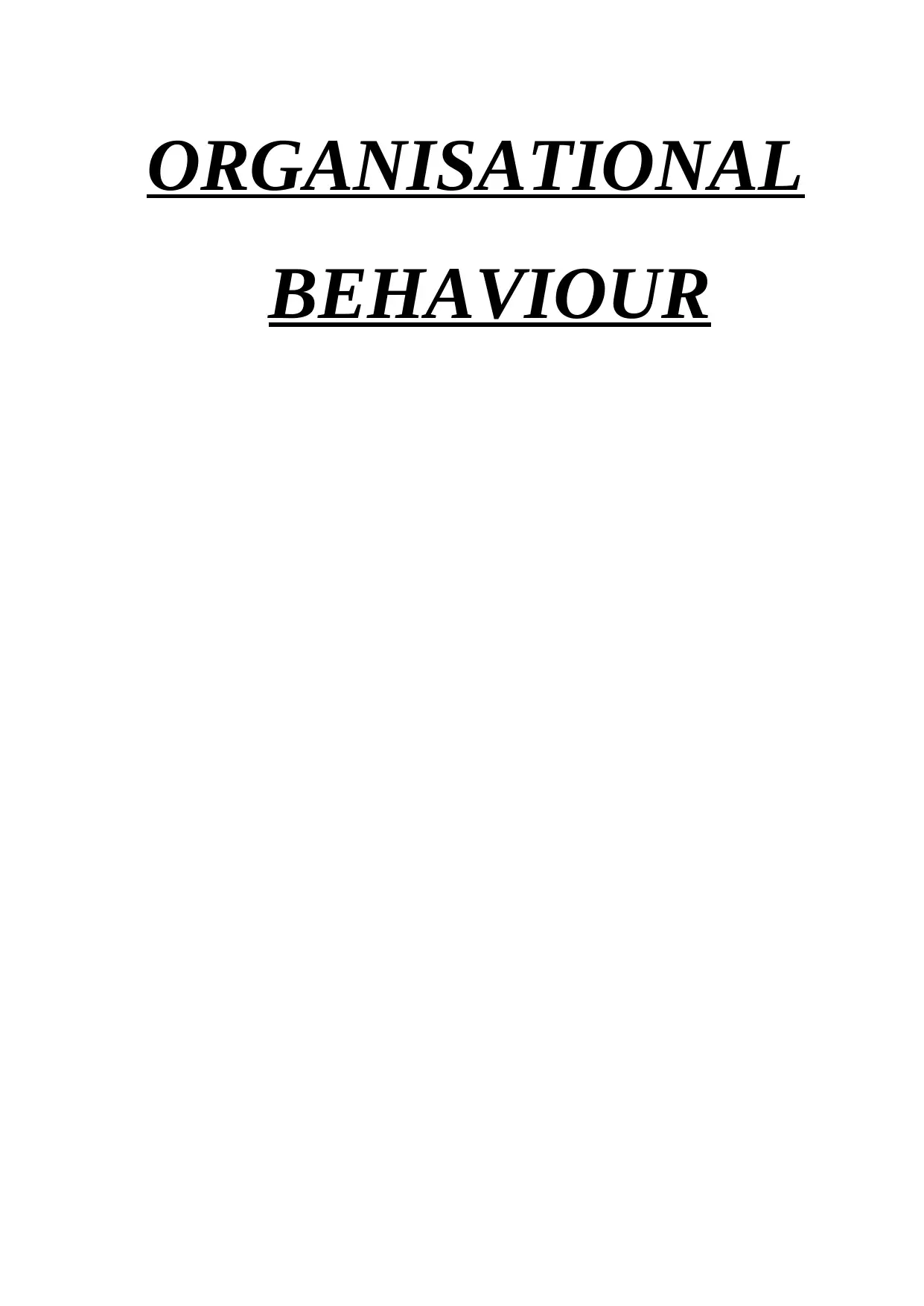
ORGANISATIONAL
BEHAVIOUR
BEHAVIOUR
Paraphrase This Document
Need a fresh take? Get an instant paraphrase of this document with our AI Paraphraser
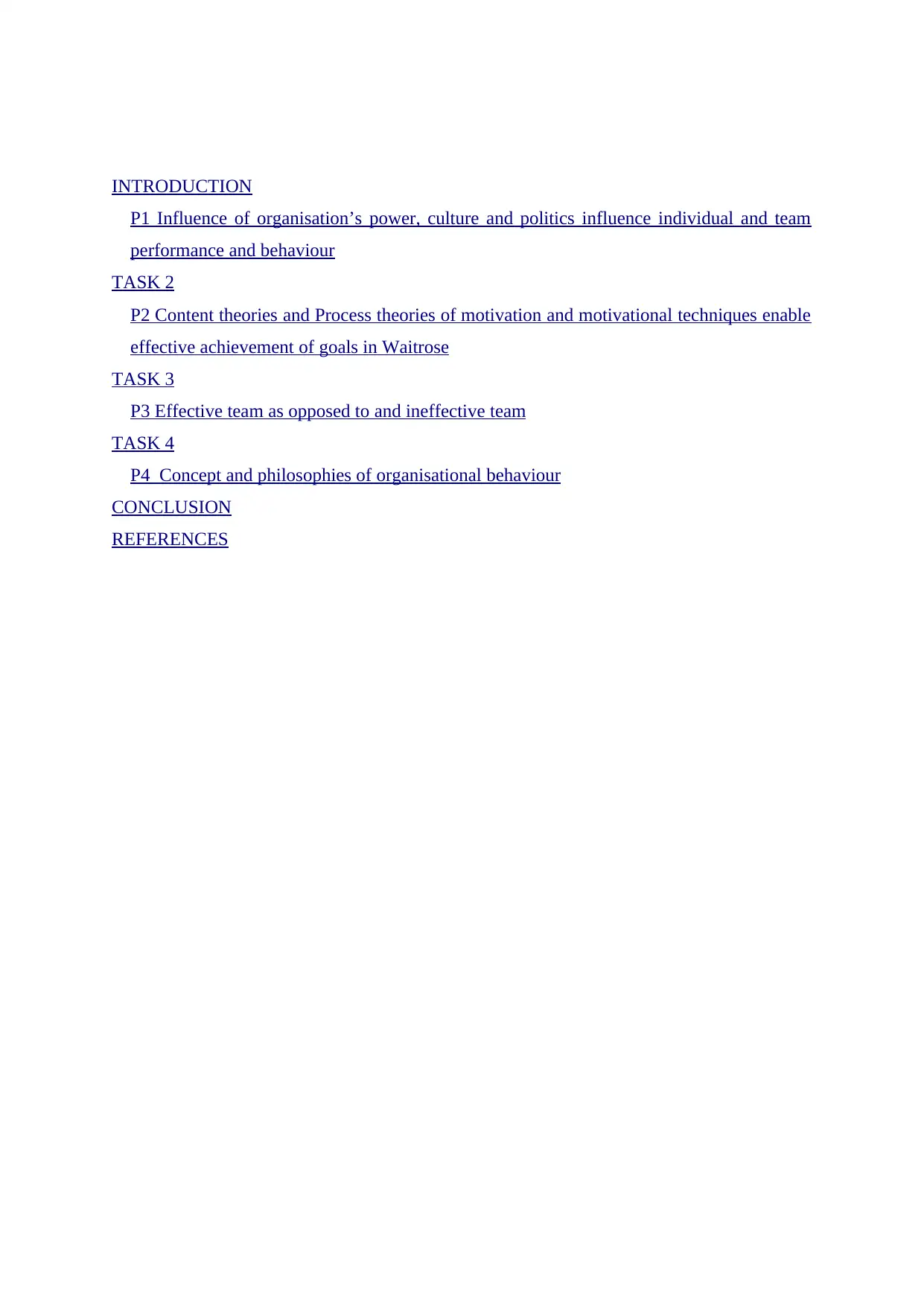
INTRODUCTION
P1 Influence of organisation’s power, culture and politics influence individual and team
performance and behaviour
TASK 2
P2 Content theories and Process theories of motivation and motivational techniques enable
effective achievement of goals in Waitrose
TASK 3
P3 Effective team as opposed to and ineffective team
TASK 4
P4 Concept and philosophies of organisational behaviour
CONCLUSION
REFERENCES
P1 Influence of organisation’s power, culture and politics influence individual and team
performance and behaviour
TASK 2
P2 Content theories and Process theories of motivation and motivational techniques enable
effective achievement of goals in Waitrose
TASK 3
P3 Effective team as opposed to and ineffective team
TASK 4
P4 Concept and philosophies of organisational behaviour
CONCLUSION
REFERENCES
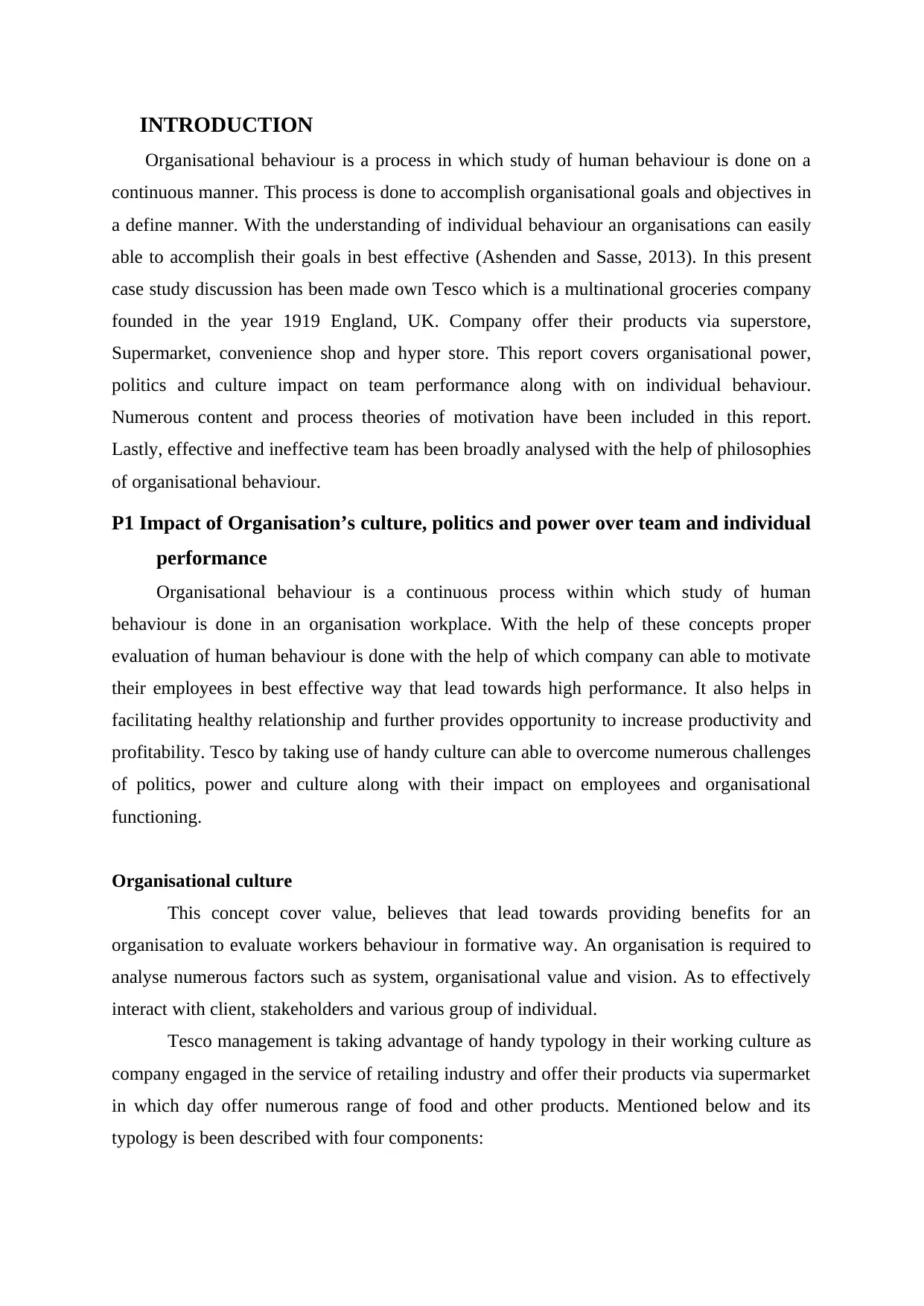
INTRODUCTION
Organisational behaviour is a process in which study of human behaviour is done on a
continuous manner. This process is done to accomplish organisational goals and objectives in
a define manner. With the understanding of individual behaviour an organisations can easily
able to accomplish their goals in best effective (Ashenden and Sasse, 2013). In this present
case study discussion has been made own Tesco which is a multinational groceries company
founded in the year 1919 England, UK. Company offer their products via superstore,
Supermarket, convenience shop and hyper store. This report covers organisational power,
politics and culture impact on team performance along with on individual behaviour.
Numerous content and process theories of motivation have been included in this report.
Lastly, effective and ineffective team has been broadly analysed with the help of philosophies
of organisational behaviour.
P1 Impact of Organisation’s culture, politics and power over team and individual
performance
Organisational behaviour is a continuous process within which study of human
behaviour is done in an organisation workplace. With the help of these concepts proper
evaluation of human behaviour is done with the help of which company can able to motivate
their employees in best effective way that lead towards high performance. It also helps in
facilitating healthy relationship and further provides opportunity to increase productivity and
profitability. Tesco by taking use of handy culture can able to overcome numerous challenges
of politics, power and culture along with their impact on employees and organisational
functioning.
Organisational culture
This concept cover value, believes that lead towards providing benefits for an
organisation to evaluate workers behaviour in formative way. An organisation is required to
analyse numerous factors such as system, organisational value and vision. As to effectively
interact with client, stakeholders and various group of individual.
Tesco management is taking advantage of handy typology in their working culture as
company engaged in the service of retailing industry and offer their products via supermarket
in which day offer numerous range of food and other products. Mentioned below and its
typology is been described with four components:
Organisational behaviour is a process in which study of human behaviour is done on a
continuous manner. This process is done to accomplish organisational goals and objectives in
a define manner. With the understanding of individual behaviour an organisations can easily
able to accomplish their goals in best effective (Ashenden and Sasse, 2013). In this present
case study discussion has been made own Tesco which is a multinational groceries company
founded in the year 1919 England, UK. Company offer their products via superstore,
Supermarket, convenience shop and hyper store. This report covers organisational power,
politics and culture impact on team performance along with on individual behaviour.
Numerous content and process theories of motivation have been included in this report.
Lastly, effective and ineffective team has been broadly analysed with the help of philosophies
of organisational behaviour.
P1 Impact of Organisation’s culture, politics and power over team and individual
performance
Organisational behaviour is a continuous process within which study of human
behaviour is done in an organisation workplace. With the help of these concepts proper
evaluation of human behaviour is done with the help of which company can able to motivate
their employees in best effective way that lead towards high performance. It also helps in
facilitating healthy relationship and further provides opportunity to increase productivity and
profitability. Tesco by taking use of handy culture can able to overcome numerous challenges
of politics, power and culture along with their impact on employees and organisational
functioning.
Organisational culture
This concept cover value, believes that lead towards providing benefits for an
organisation to evaluate workers behaviour in formative way. An organisation is required to
analyse numerous factors such as system, organisational value and vision. As to effectively
interact with client, stakeholders and various group of individual.
Tesco management is taking advantage of handy typology in their working culture as
company engaged in the service of retailing industry and offer their products via supermarket
in which day offer numerous range of food and other products. Mentioned below and its
typology is been described with four components:
⊘ This is a preview!⊘
Do you want full access?
Subscribe today to unlock all pages.

Trusted by 1+ million students worldwide
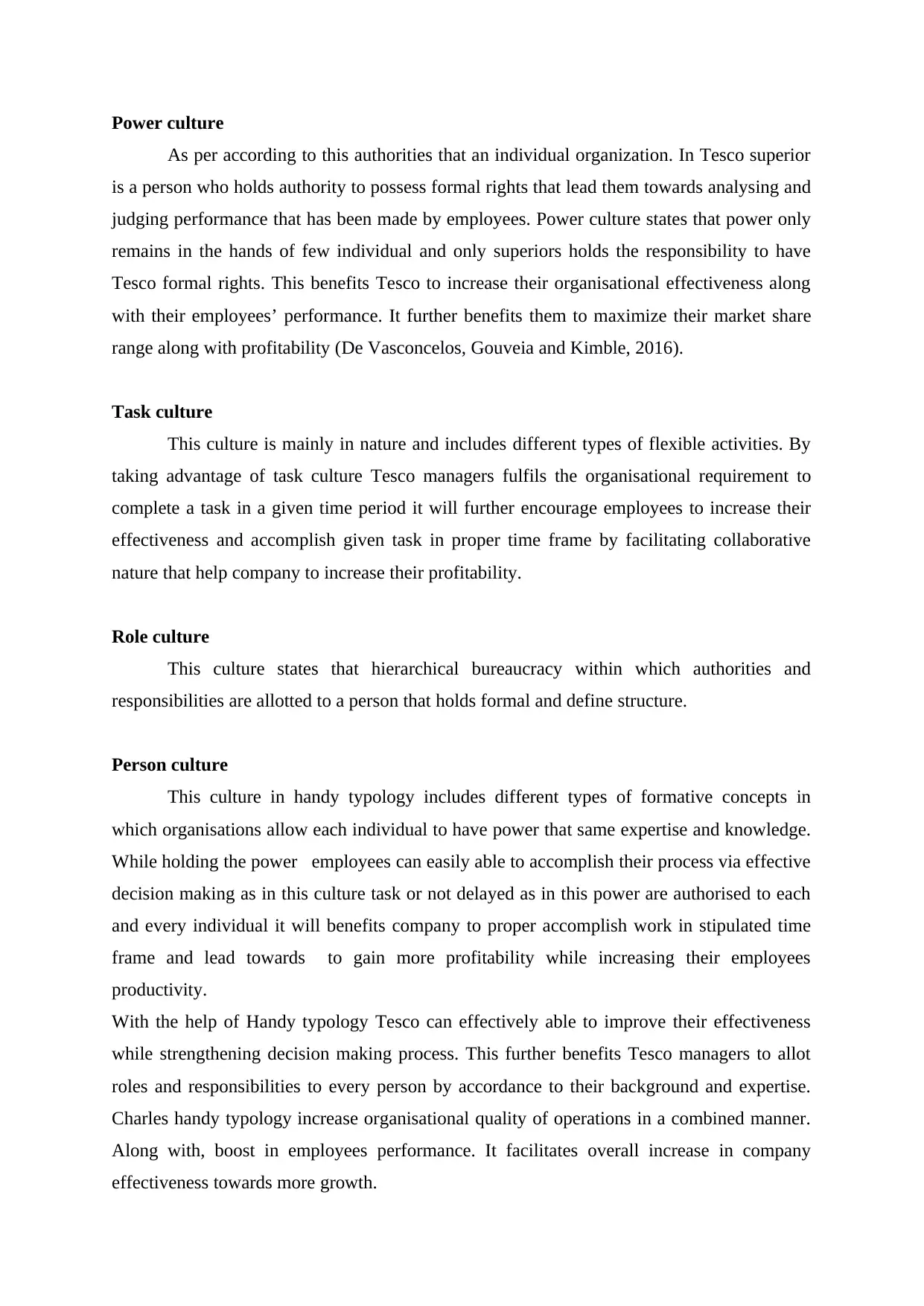
Power culture
As per according to this authorities that an individual organization. In Tesco superior
is a person who holds authority to possess formal rights that lead them towards analysing and
judging performance that has been made by employees. Power culture states that power only
remains in the hands of few individual and only superiors holds the responsibility to have
Tesco formal rights. This benefits Tesco to increase their organisational effectiveness along
with their employees’ performance. It further benefits them to maximize their market share
range along with profitability (De Vasconcelos, Gouveia and Kimble, 2016).
Task culture
This culture is mainly in nature and includes different types of flexible activities. By
taking advantage of task culture Tesco managers fulfils the organisational requirement to
complete a task in a given time period it will further encourage employees to increase their
effectiveness and accomplish given task in proper time frame by facilitating collaborative
nature that help company to increase their profitability.
Role culture
This culture states that hierarchical bureaucracy within which authorities and
responsibilities are allotted to a person that holds formal and define structure.
Person culture
This culture in handy typology includes different types of formative concepts in
which organisations allow each individual to have power that same expertise and knowledge.
While holding the power employees can easily able to accomplish their process via effective
decision making as in this culture task or not delayed as in this power are authorised to each
and every individual it will benefits company to proper accomplish work in stipulated time
frame and lead towards to gain more profitability while increasing their employees
productivity.
With the help of Handy typology Tesco can effectively able to improve their effectiveness
while strengthening decision making process. This further benefits Tesco managers to allot
roles and responsibilities to every person by accordance to their background and expertise.
Charles handy typology increase organisational quality of operations in a combined manner.
Along with, boost in employees performance. It facilitates overall increase in company
effectiveness towards more growth.
As per according to this authorities that an individual organization. In Tesco superior
is a person who holds authority to possess formal rights that lead them towards analysing and
judging performance that has been made by employees. Power culture states that power only
remains in the hands of few individual and only superiors holds the responsibility to have
Tesco formal rights. This benefits Tesco to increase their organisational effectiveness along
with their employees’ performance. It further benefits them to maximize their market share
range along with profitability (De Vasconcelos, Gouveia and Kimble, 2016).
Task culture
This culture is mainly in nature and includes different types of flexible activities. By
taking advantage of task culture Tesco managers fulfils the organisational requirement to
complete a task in a given time period it will further encourage employees to increase their
effectiveness and accomplish given task in proper time frame by facilitating collaborative
nature that help company to increase their profitability.
Role culture
This culture states that hierarchical bureaucracy within which authorities and
responsibilities are allotted to a person that holds formal and define structure.
Person culture
This culture in handy typology includes different types of formative concepts in
which organisations allow each individual to have power that same expertise and knowledge.
While holding the power employees can easily able to accomplish their process via effective
decision making as in this culture task or not delayed as in this power are authorised to each
and every individual it will benefits company to proper accomplish work in stipulated time
frame and lead towards to gain more profitability while increasing their employees
productivity.
With the help of Handy typology Tesco can effectively able to improve their effectiveness
while strengthening decision making process. This further benefits Tesco managers to allot
roles and responsibilities to every person by accordance to their background and expertise.
Charles handy typology increase organisational quality of operations in a combined manner.
Along with, boost in employees performance. It facilitates overall increase in company
effectiveness towards more growth.
Paraphrase This Document
Need a fresh take? Get an instant paraphrase of this document with our AI Paraphraser
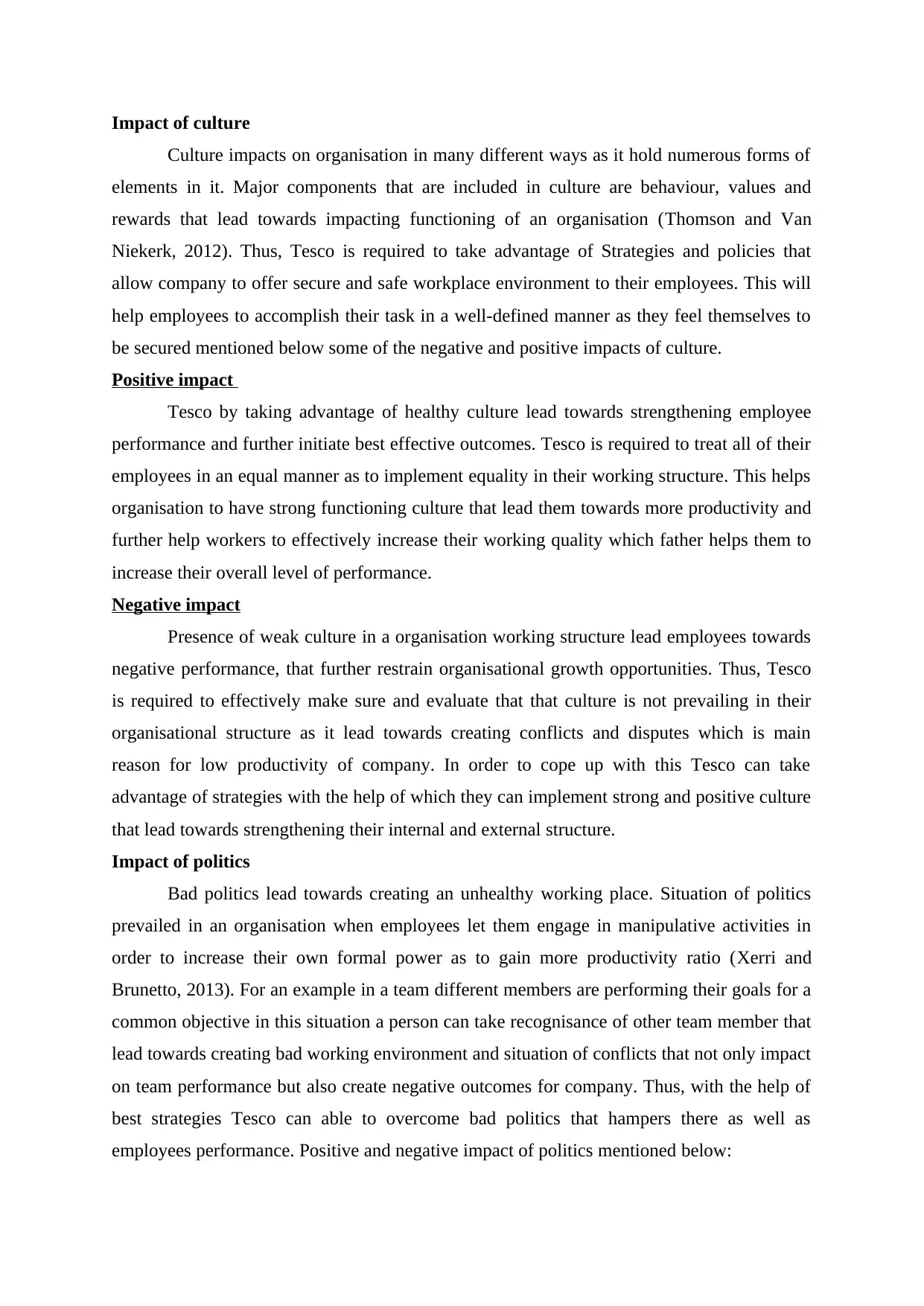
Impact of culture
Culture impacts on organisation in many different ways as it hold numerous forms of
elements in it. Major components that are included in culture are behaviour, values and
rewards that lead towards impacting functioning of an organisation (Thomson and Van
Niekerk, 2012). Thus, Tesco is required to take advantage of Strategies and policies that
allow company to offer secure and safe workplace environment to their employees. This will
help employees to accomplish their task in a well-defined manner as they feel themselves to
be secured mentioned below some of the negative and positive impacts of culture.
Positive impact
Tesco by taking advantage of healthy culture lead towards strengthening employee
performance and further initiate best effective outcomes. Tesco is required to treat all of their
employees in an equal manner as to implement equality in their working structure. This helps
organisation to have strong functioning culture that lead them towards more productivity and
further help workers to effectively increase their working quality which father helps them to
increase their overall level of performance.
Negative impact
Presence of weak culture in a organisation working structure lead employees towards
negative performance, that further restrain organisational growth opportunities. Thus, Tesco
is required to effectively make sure and evaluate that that culture is not prevailing in their
organisational structure as it lead towards creating conflicts and disputes which is main
reason for low productivity of company. In order to cope up with this Tesco can take
advantage of strategies with the help of which they can implement strong and positive culture
that lead towards strengthening their internal and external structure.
Impact of politics
Bad politics lead towards creating an unhealthy working place. Situation of politics
prevailed in an organisation when employees let them engage in manipulative activities in
order to increase their own formal power as to gain more productivity ratio (Xerri and
Brunetto, 2013). For an example in a team different members are performing their goals for a
common objective in this situation a person can take recognisance of other team member that
lead towards creating bad working environment and situation of conflicts that not only impact
on team performance but also create negative outcomes for company. Thus, with the help of
best strategies Tesco can able to overcome bad politics that hampers there as well as
employees performance. Positive and negative impact of politics mentioned below:
Culture impacts on organisation in many different ways as it hold numerous forms of
elements in it. Major components that are included in culture are behaviour, values and
rewards that lead towards impacting functioning of an organisation (Thomson and Van
Niekerk, 2012). Thus, Tesco is required to take advantage of Strategies and policies that
allow company to offer secure and safe workplace environment to their employees. This will
help employees to accomplish their task in a well-defined manner as they feel themselves to
be secured mentioned below some of the negative and positive impacts of culture.
Positive impact
Tesco by taking advantage of healthy culture lead towards strengthening employee
performance and further initiate best effective outcomes. Tesco is required to treat all of their
employees in an equal manner as to implement equality in their working structure. This helps
organisation to have strong functioning culture that lead them towards more productivity and
further help workers to effectively increase their working quality which father helps them to
increase their overall level of performance.
Negative impact
Presence of weak culture in a organisation working structure lead employees towards
negative performance, that further restrain organisational growth opportunities. Thus, Tesco
is required to effectively make sure and evaluate that that culture is not prevailing in their
organisational structure as it lead towards creating conflicts and disputes which is main
reason for low productivity of company. In order to cope up with this Tesco can take
advantage of strategies with the help of which they can implement strong and positive culture
that lead towards strengthening their internal and external structure.
Impact of politics
Bad politics lead towards creating an unhealthy working place. Situation of politics
prevailed in an organisation when employees let them engage in manipulative activities in
order to increase their own formal power as to gain more productivity ratio (Xerri and
Brunetto, 2013). For an example in a team different members are performing their goals for a
common objective in this situation a person can take recognisance of other team member that
lead towards creating bad working environment and situation of conflicts that not only impact
on team performance but also create negative outcomes for company. Thus, with the help of
best strategies Tesco can able to overcome bad politics that hampers there as well as
employees performance. Positive and negative impact of politics mentioned below:
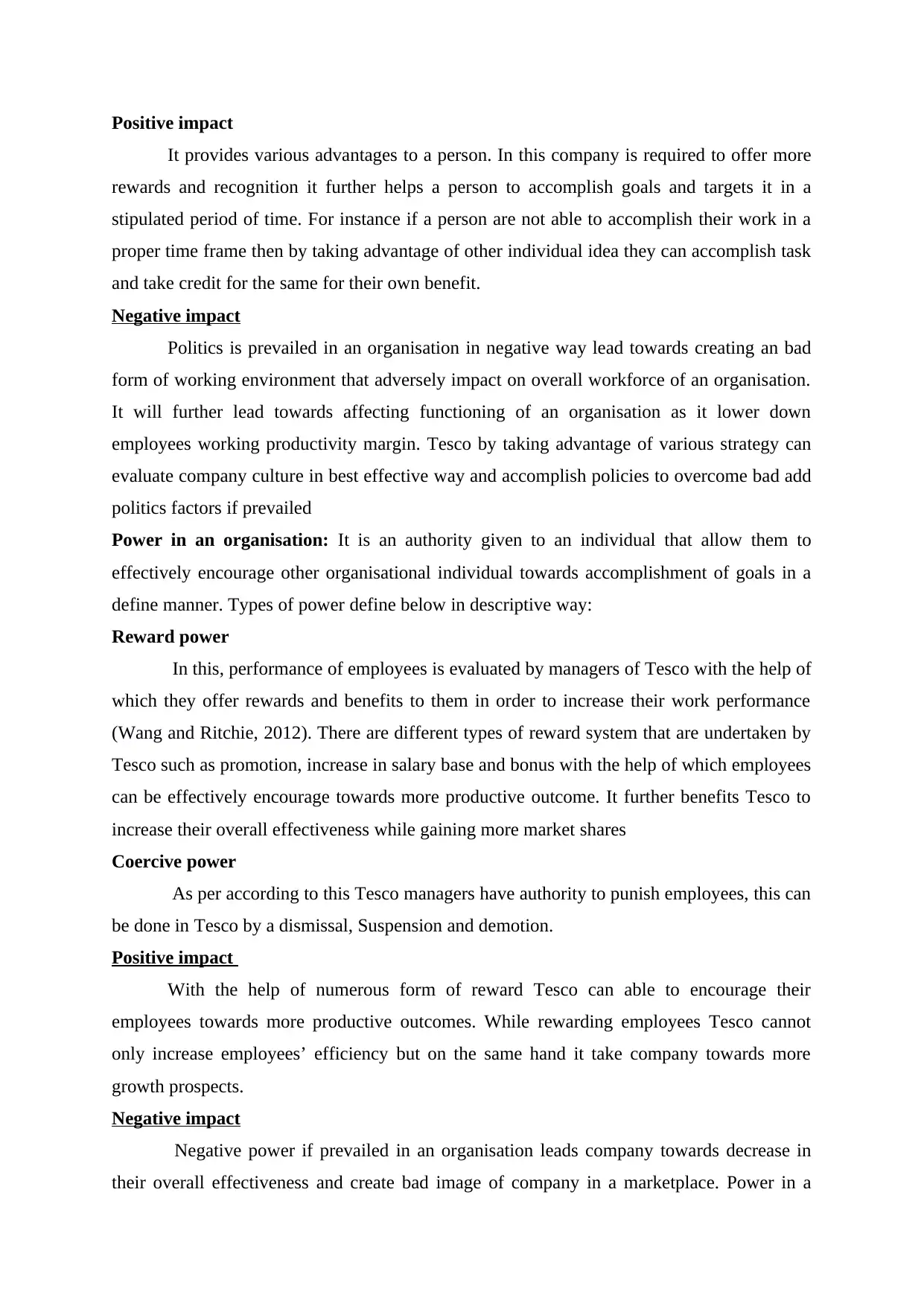
Positive impact
It provides various advantages to a person. In this company is required to offer more
rewards and recognition it further helps a person to accomplish goals and targets it in a
stipulated period of time. For instance if a person are not able to accomplish their work in a
proper time frame then by taking advantage of other individual idea they can accomplish task
and take credit for the same for their own benefit.
Negative impact
Politics is prevailed in an organisation in negative way lead towards creating an bad
form of working environment that adversely impact on overall workforce of an organisation.
It will further lead towards affecting functioning of an organisation as it lower down
employees working productivity margin. Tesco by taking advantage of various strategy can
evaluate company culture in best effective way and accomplish policies to overcome bad add
politics factors if prevailed
Power in an organisation: It is an authority given to an individual that allow them to
effectively encourage other organisational individual towards accomplishment of goals in a
define manner. Types of power define below in descriptive way:
Reward power
In this, performance of employees is evaluated by managers of Tesco with the help of
which they offer rewards and benefits to them in order to increase their work performance
(Wang and Ritchie, 2012). There are different types of reward system that are undertaken by
Tesco such as promotion, increase in salary base and bonus with the help of which employees
can be effectively encourage towards more productive outcome. It further benefits Tesco to
increase their overall effectiveness while gaining more market shares
Coercive power
As per according to this Tesco managers have authority to punish employees, this can
be done in Tesco by a dismissal, Suspension and demotion.
Positive impact
With the help of numerous form of reward Tesco can able to encourage their
employees towards more productive outcomes. While rewarding employees Tesco cannot
only increase employees’ efficiency but on the same hand it take company towards more
growth prospects.
Negative impact
Negative power if prevailed in an organisation leads company towards decrease in
their overall effectiveness and create bad image of company in a marketplace. Power in a
It provides various advantages to a person. In this company is required to offer more
rewards and recognition it further helps a person to accomplish goals and targets it in a
stipulated period of time. For instance if a person are not able to accomplish their work in a
proper time frame then by taking advantage of other individual idea they can accomplish task
and take credit for the same for their own benefit.
Negative impact
Politics is prevailed in an organisation in negative way lead towards creating an bad
form of working environment that adversely impact on overall workforce of an organisation.
It will further lead towards affecting functioning of an organisation as it lower down
employees working productivity margin. Tesco by taking advantage of various strategy can
evaluate company culture in best effective way and accomplish policies to overcome bad add
politics factors if prevailed
Power in an organisation: It is an authority given to an individual that allow them to
effectively encourage other organisational individual towards accomplishment of goals in a
define manner. Types of power define below in descriptive way:
Reward power
In this, performance of employees is evaluated by managers of Tesco with the help of
which they offer rewards and benefits to them in order to increase their work performance
(Wang and Ritchie, 2012). There are different types of reward system that are undertaken by
Tesco such as promotion, increase in salary base and bonus with the help of which employees
can be effectively encourage towards more productive outcome. It further benefits Tesco to
increase their overall effectiveness while gaining more market shares
Coercive power
As per according to this Tesco managers have authority to punish employees, this can
be done in Tesco by a dismissal, Suspension and demotion.
Positive impact
With the help of numerous form of reward Tesco can able to encourage their
employees towards more productive outcomes. While rewarding employees Tesco cannot
only increase employees’ efficiency but on the same hand it take company towards more
growth prospects.
Negative impact
Negative power if prevailed in an organisation leads company towards decrease in
their overall effectiveness and create bad image of company in a marketplace. Power in a
⊘ This is a preview!⊘
Do you want full access?
Subscribe today to unlock all pages.

Trusted by 1+ million students worldwide
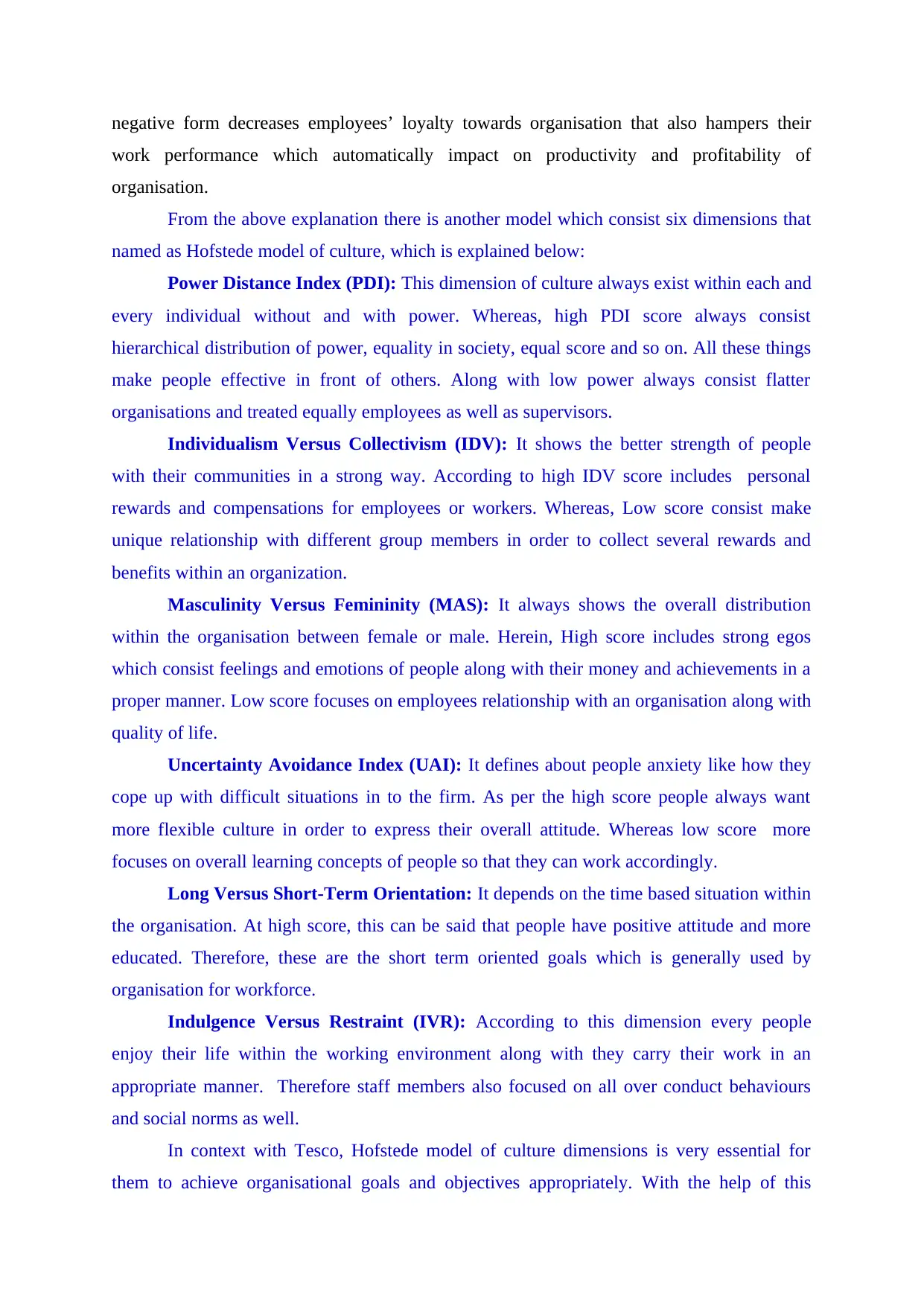
negative form decreases employees’ loyalty towards organisation that also hampers their
work performance which automatically impact on productivity and profitability of
organisation.
From the above explanation there is another model which consist six dimensions that
named as Hofstede model of culture, which is explained below:
Power Distance Index (PDI): This dimension of culture always exist within each and
every individual without and with power. Whereas, high PDI score always consist
hierarchical distribution of power, equality in society, equal score and so on. All these things
make people effective in front of others. Along with low power always consist flatter
organisations and treated equally employees as well as supervisors.
Individualism Versus Collectivism (IDV): It shows the better strength of people
with their communities in a strong way. According to high IDV score includes personal
rewards and compensations for employees or workers. Whereas, Low score consist make
unique relationship with different group members in order to collect several rewards and
benefits within an organization.
Masculinity Versus Femininity (MAS): It always shows the overall distribution
within the organisation between female or male. Herein, High score includes strong egos
which consist feelings and emotions of people along with their money and achievements in a
proper manner. Low score focuses on employees relationship with an organisation along with
quality of life.
Uncertainty Avoidance Index (UAI): It defines about people anxiety like how they
cope up with difficult situations in to the firm. As per the high score people always want
more flexible culture in order to express their overall attitude. Whereas low score more
focuses on overall learning concepts of people so that they can work accordingly.
Long Versus Short-Term Orientation: It depends on the time based situation within
the organisation. At high score, this can be said that people have positive attitude and more
educated. Therefore, these are the short term oriented goals which is generally used by
organisation for workforce.
Indulgence Versus Restraint (IVR): According to this dimension every people
enjoy their life within the working environment along with they carry their work in an
appropriate manner. Therefore staff members also focused on all over conduct behaviours
and social norms as well.
In context with Tesco, Hofstede model of culture dimensions is very essential for
them to achieve organisational goals and objectives appropriately. With the help of this
work performance which automatically impact on productivity and profitability of
organisation.
From the above explanation there is another model which consist six dimensions that
named as Hofstede model of culture, which is explained below:
Power Distance Index (PDI): This dimension of culture always exist within each and
every individual without and with power. Whereas, high PDI score always consist
hierarchical distribution of power, equality in society, equal score and so on. All these things
make people effective in front of others. Along with low power always consist flatter
organisations and treated equally employees as well as supervisors.
Individualism Versus Collectivism (IDV): It shows the better strength of people
with their communities in a strong way. According to high IDV score includes personal
rewards and compensations for employees or workers. Whereas, Low score consist make
unique relationship with different group members in order to collect several rewards and
benefits within an organization.
Masculinity Versus Femininity (MAS): It always shows the overall distribution
within the organisation between female or male. Herein, High score includes strong egos
which consist feelings and emotions of people along with their money and achievements in a
proper manner. Low score focuses on employees relationship with an organisation along with
quality of life.
Uncertainty Avoidance Index (UAI): It defines about people anxiety like how they
cope up with difficult situations in to the firm. As per the high score people always want
more flexible culture in order to express their overall attitude. Whereas low score more
focuses on overall learning concepts of people so that they can work accordingly.
Long Versus Short-Term Orientation: It depends on the time based situation within
the organisation. At high score, this can be said that people have positive attitude and more
educated. Therefore, these are the short term oriented goals which is generally used by
organisation for workforce.
Indulgence Versus Restraint (IVR): According to this dimension every people
enjoy their life within the working environment along with they carry their work in an
appropriate manner. Therefore staff members also focused on all over conduct behaviours
and social norms as well.
In context with Tesco, Hofstede model of culture dimensions is very essential for
them to achieve organisational goals and objectives appropriately. With the help of this
Paraphrase This Document
Need a fresh take? Get an instant paraphrase of this document with our AI Paraphraser
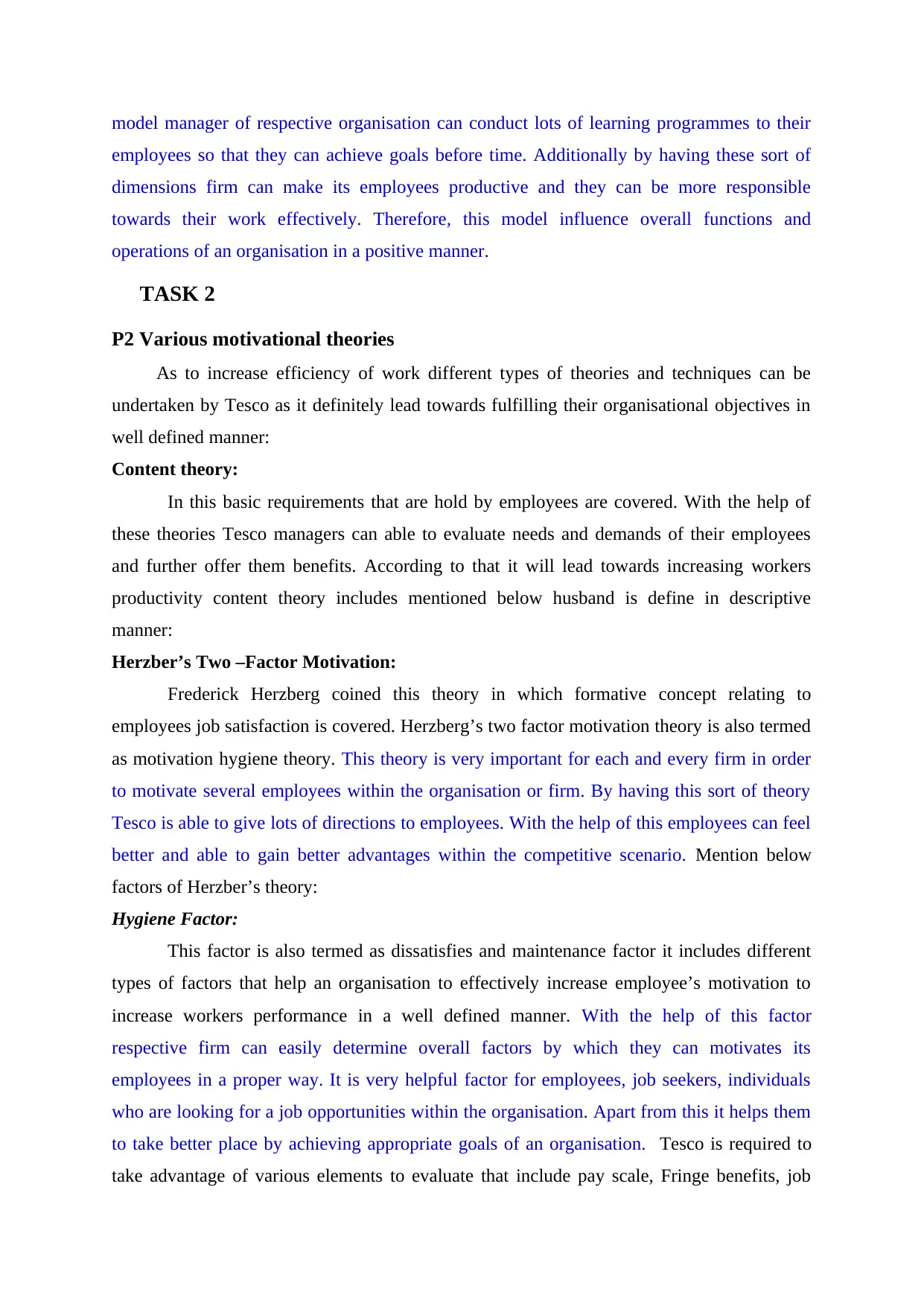
model manager of respective organisation can conduct lots of learning programmes to their
employees so that they can achieve goals before time. Additionally by having these sort of
dimensions firm can make its employees productive and they can be more responsible
towards their work effectively. Therefore, this model influence overall functions and
operations of an organisation in a positive manner.
TASK 2
P2 Various motivational theories
As to increase efficiency of work different types of theories and techniques can be
undertaken by Tesco as it definitely lead towards fulfilling their organisational objectives in
well defined manner:
Content theory:
In this basic requirements that are hold by employees are covered. With the help of
these theories Tesco managers can able to evaluate needs and demands of their employees
and further offer them benefits. According to that it will lead towards increasing workers
productivity content theory includes mentioned below husband is define in descriptive
manner:
Herzber’s Two –Factor Motivation:
Frederick Herzberg coined this theory in which formative concept relating to
employees job satisfaction is covered. Herzberg’s two factor motivation theory is also termed
as motivation hygiene theory. This theory is very important for each and every firm in order
to motivate several employees within the organisation or firm. By having this sort of theory
Tesco is able to give lots of directions to employees. With the help of this employees can feel
better and able to gain better advantages within the competitive scenario. Mention below
factors of Herzber’s theory:
Hygiene Factor:
This factor is also termed as dissatisfies and maintenance factor it includes different
types of factors that help an organisation to effectively increase employee’s motivation to
increase workers performance in a well defined manner. With the help of this factor
respective firm can easily determine overall factors by which they can motivates its
employees in a proper way. It is very helpful factor for employees, job seekers, individuals
who are looking for a job opportunities within the organisation. Apart from this it helps them
to take better place by achieving appropriate goals of an organisation. Tesco is required to
take advantage of various elements to evaluate that include pay scale, Fringe benefits, job
employees so that they can achieve goals before time. Additionally by having these sort of
dimensions firm can make its employees productive and they can be more responsible
towards their work effectively. Therefore, this model influence overall functions and
operations of an organisation in a positive manner.
TASK 2
P2 Various motivational theories
As to increase efficiency of work different types of theories and techniques can be
undertaken by Tesco as it definitely lead towards fulfilling their organisational objectives in
well defined manner:
Content theory:
In this basic requirements that are hold by employees are covered. With the help of
these theories Tesco managers can able to evaluate needs and demands of their employees
and further offer them benefits. According to that it will lead towards increasing workers
productivity content theory includes mentioned below husband is define in descriptive
manner:
Herzber’s Two –Factor Motivation:
Frederick Herzberg coined this theory in which formative concept relating to
employees job satisfaction is covered. Herzberg’s two factor motivation theory is also termed
as motivation hygiene theory. This theory is very important for each and every firm in order
to motivate several employees within the organisation or firm. By having this sort of theory
Tesco is able to give lots of directions to employees. With the help of this employees can feel
better and able to gain better advantages within the competitive scenario. Mention below
factors of Herzber’s theory:
Hygiene Factor:
This factor is also termed as dissatisfies and maintenance factor it includes different
types of factors that help an organisation to effectively increase employee’s motivation to
increase workers performance in a well defined manner. With the help of this factor
respective firm can easily determine overall factors by which they can motivates its
employees in a proper way. It is very helpful factor for employees, job seekers, individuals
who are looking for a job opportunities within the organisation. Apart from this it helps them
to take better place by achieving appropriate goals of an organisation. Tesco is required to
take advantage of various elements to evaluate that include pay scale, Fringe benefits, job
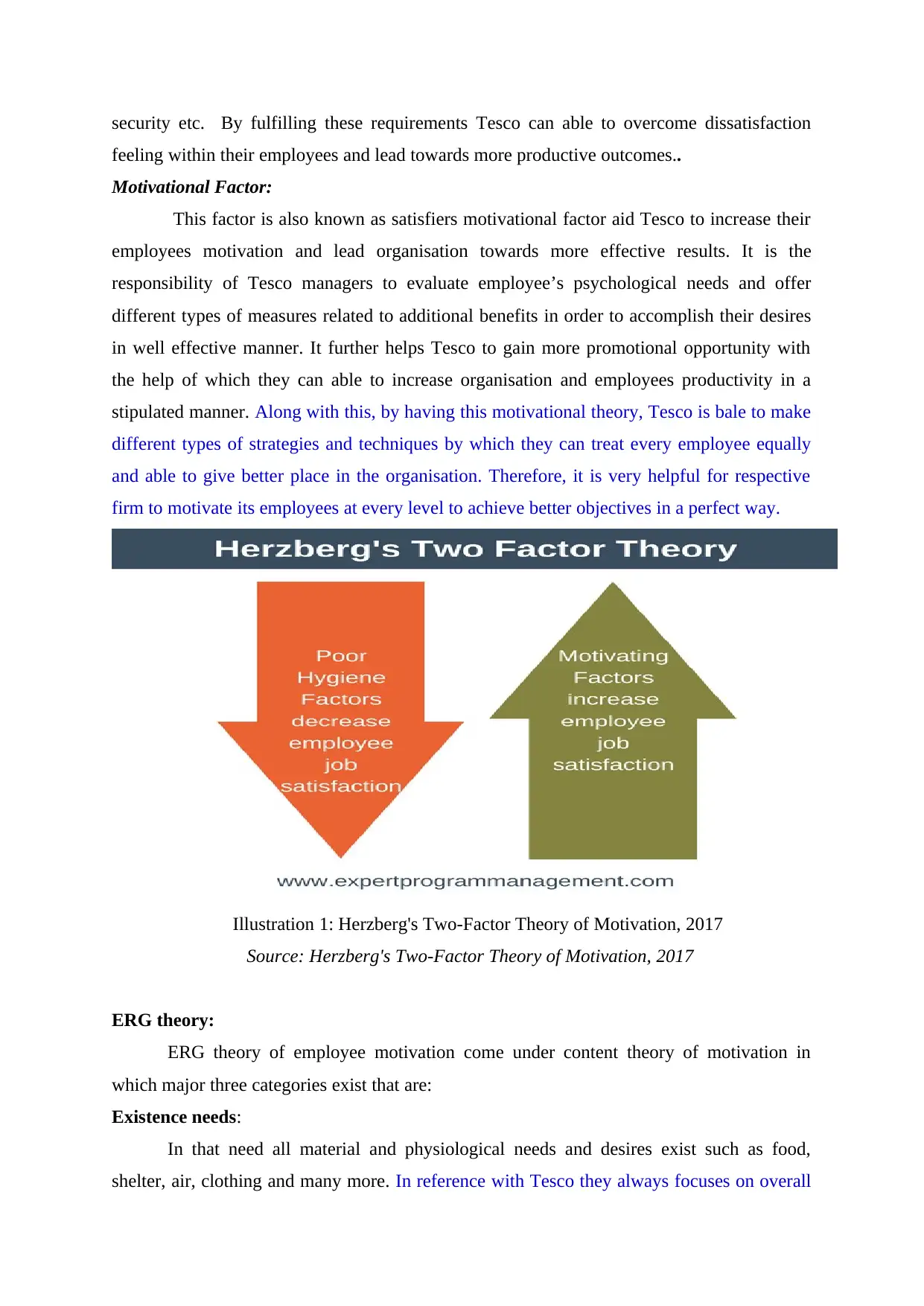
security etc. By fulfilling these requirements Tesco can able to overcome dissatisfaction
feeling within their employees and lead towards more productive outcomes..
Motivational Factor:
This factor is also known as satisfiers motivational factor aid Tesco to increase their
employees motivation and lead organisation towards more effective results. It is the
responsibility of Tesco managers to evaluate employee’s psychological needs and offer
different types of measures related to additional benefits in order to accomplish their desires
in well effective manner. It further helps Tesco to gain more promotional opportunity with
the help of which they can able to increase organisation and employees productivity in a
stipulated manner. Along with this, by having this motivational theory, Tesco is bale to make
different types of strategies and techniques by which they can treat every employee equally
and able to give better place in the organisation. Therefore, it is very helpful for respective
firm to motivate its employees at every level to achieve better objectives in a perfect way.
Illustration 1: Herzberg's Two-Factor Theory of Motivation, 2017
Source: Herzberg's Two-Factor Theory of Motivation, 2017
ERG theory:
ERG theory of employee motivation come under content theory of motivation in
which major three categories exist that are:
Existence needs:
In that need all material and physiological needs and desires exist such as food,
shelter, air, clothing and many more. In reference with Tesco they always focuses on overall
feeling within their employees and lead towards more productive outcomes..
Motivational Factor:
This factor is also known as satisfiers motivational factor aid Tesco to increase their
employees motivation and lead organisation towards more effective results. It is the
responsibility of Tesco managers to evaluate employee’s psychological needs and offer
different types of measures related to additional benefits in order to accomplish their desires
in well effective manner. It further helps Tesco to gain more promotional opportunity with
the help of which they can able to increase organisation and employees productivity in a
stipulated manner. Along with this, by having this motivational theory, Tesco is bale to make
different types of strategies and techniques by which they can treat every employee equally
and able to give better place in the organisation. Therefore, it is very helpful for respective
firm to motivate its employees at every level to achieve better objectives in a perfect way.
Illustration 1: Herzberg's Two-Factor Theory of Motivation, 2017
Source: Herzberg's Two-Factor Theory of Motivation, 2017
ERG theory:
ERG theory of employee motivation come under content theory of motivation in
which major three categories exist that are:
Existence needs:
In that need all material and physiological needs and desires exist such as food,
shelter, air, clothing and many more. In reference with Tesco they always focuses on overall
⊘ This is a preview!⊘
Do you want full access?
Subscribe today to unlock all pages.

Trusted by 1+ million students worldwide
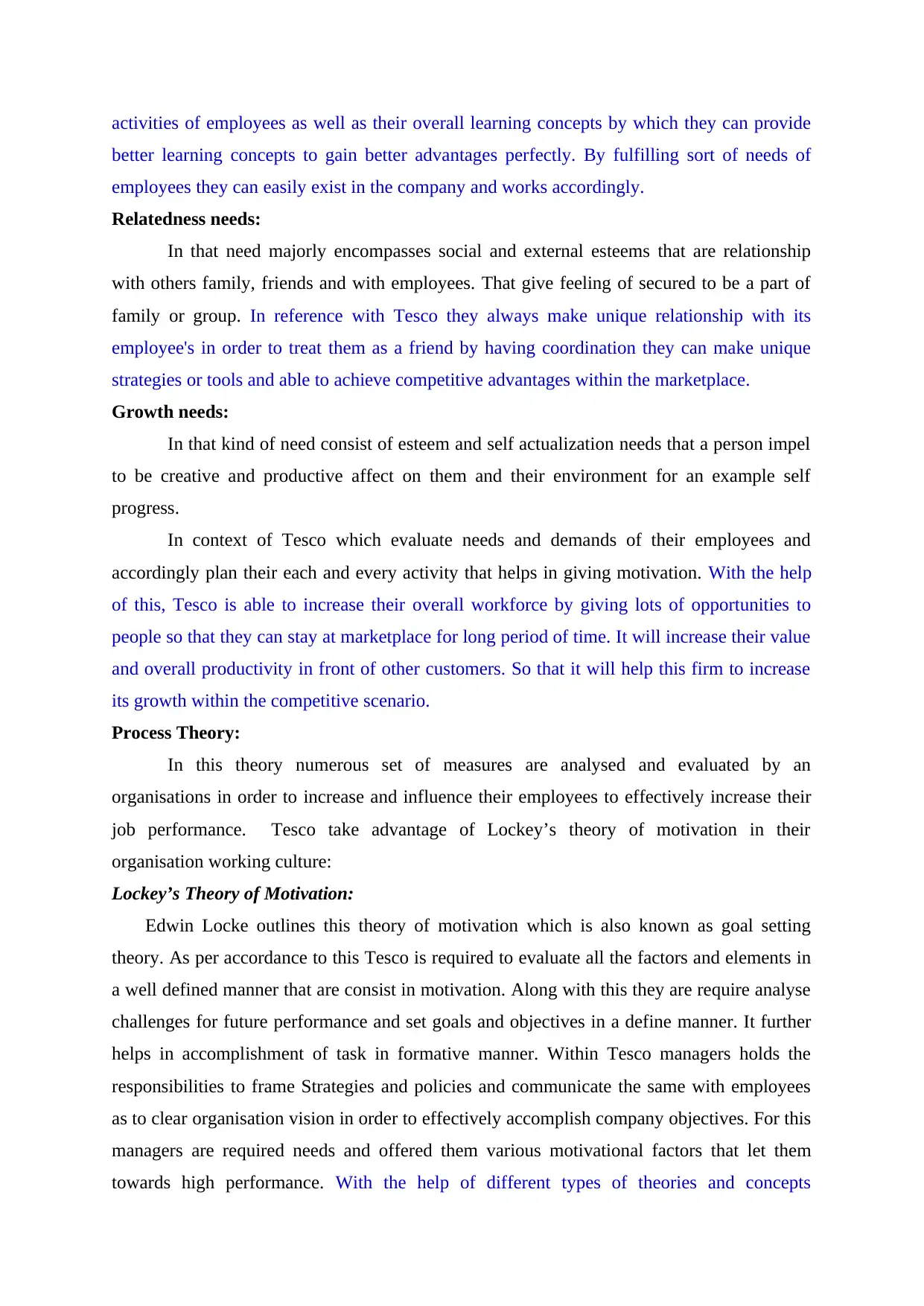
activities of employees as well as their overall learning concepts by which they can provide
better learning concepts to gain better advantages perfectly. By fulfilling sort of needs of
employees they can easily exist in the company and works accordingly.
Relatedness needs:
In that need majorly encompasses social and external esteems that are relationship
with others family, friends and with employees. That give feeling of secured to be a part of
family or group. In reference with Tesco they always make unique relationship with its
employee's in order to treat them as a friend by having coordination they can make unique
strategies or tools and able to achieve competitive advantages within the marketplace.
Growth needs:
In that kind of need consist of esteem and self actualization needs that a person impel
to be creative and productive affect on them and their environment for an example self
progress.
In context of Tesco which evaluate needs and demands of their employees and
accordingly plan their each and every activity that helps in giving motivation. With the help
of this, Tesco is able to increase their overall workforce by giving lots of opportunities to
people so that they can stay at marketplace for long period of time. It will increase their value
and overall productivity in front of other customers. So that it will help this firm to increase
its growth within the competitive scenario.
Process Theory:
In this theory numerous set of measures are analysed and evaluated by an
organisations in order to increase and influence their employees to effectively increase their
job performance. Tesco take advantage of Lockey’s theory of motivation in their
organisation working culture:
Lockey’s Theory of Motivation:
Edwin Locke outlines this theory of motivation which is also known as goal setting
theory. As per accordance to this Tesco is required to evaluate all the factors and elements in
a well defined manner that are consist in motivation. Along with this they are require analyse
challenges for future performance and set goals and objectives in a define manner. It further
helps in accomplishment of task in formative manner. Within Tesco managers holds the
responsibilities to frame Strategies and policies and communicate the same with employees
as to clear organisation vision in order to effectively accomplish company objectives. For this
managers are required needs and offered them various motivational factors that let them
towards high performance. With the help of different types of theories and concepts
better learning concepts to gain better advantages perfectly. By fulfilling sort of needs of
employees they can easily exist in the company and works accordingly.
Relatedness needs:
In that need majorly encompasses social and external esteems that are relationship
with others family, friends and with employees. That give feeling of secured to be a part of
family or group. In reference with Tesco they always make unique relationship with its
employee's in order to treat them as a friend by having coordination they can make unique
strategies or tools and able to achieve competitive advantages within the marketplace.
Growth needs:
In that kind of need consist of esteem and self actualization needs that a person impel
to be creative and productive affect on them and their environment for an example self
progress.
In context of Tesco which evaluate needs and demands of their employees and
accordingly plan their each and every activity that helps in giving motivation. With the help
of this, Tesco is able to increase their overall workforce by giving lots of opportunities to
people so that they can stay at marketplace for long period of time. It will increase their value
and overall productivity in front of other customers. So that it will help this firm to increase
its growth within the competitive scenario.
Process Theory:
In this theory numerous set of measures are analysed and evaluated by an
organisations in order to increase and influence their employees to effectively increase their
job performance. Tesco take advantage of Lockey’s theory of motivation in their
organisation working culture:
Lockey’s Theory of Motivation:
Edwin Locke outlines this theory of motivation which is also known as goal setting
theory. As per accordance to this Tesco is required to evaluate all the factors and elements in
a well defined manner that are consist in motivation. Along with this they are require analyse
challenges for future performance and set goals and objectives in a define manner. It further
helps in accomplishment of task in formative manner. Within Tesco managers holds the
responsibilities to frame Strategies and policies and communicate the same with employees
as to clear organisation vision in order to effectively accomplish company objectives. For this
managers are required needs and offered them various motivational factors that let them
towards high performance. With the help of different types of theories and concepts
Paraphrase This Document
Need a fresh take? Get an instant paraphrase of this document with our AI Paraphraser
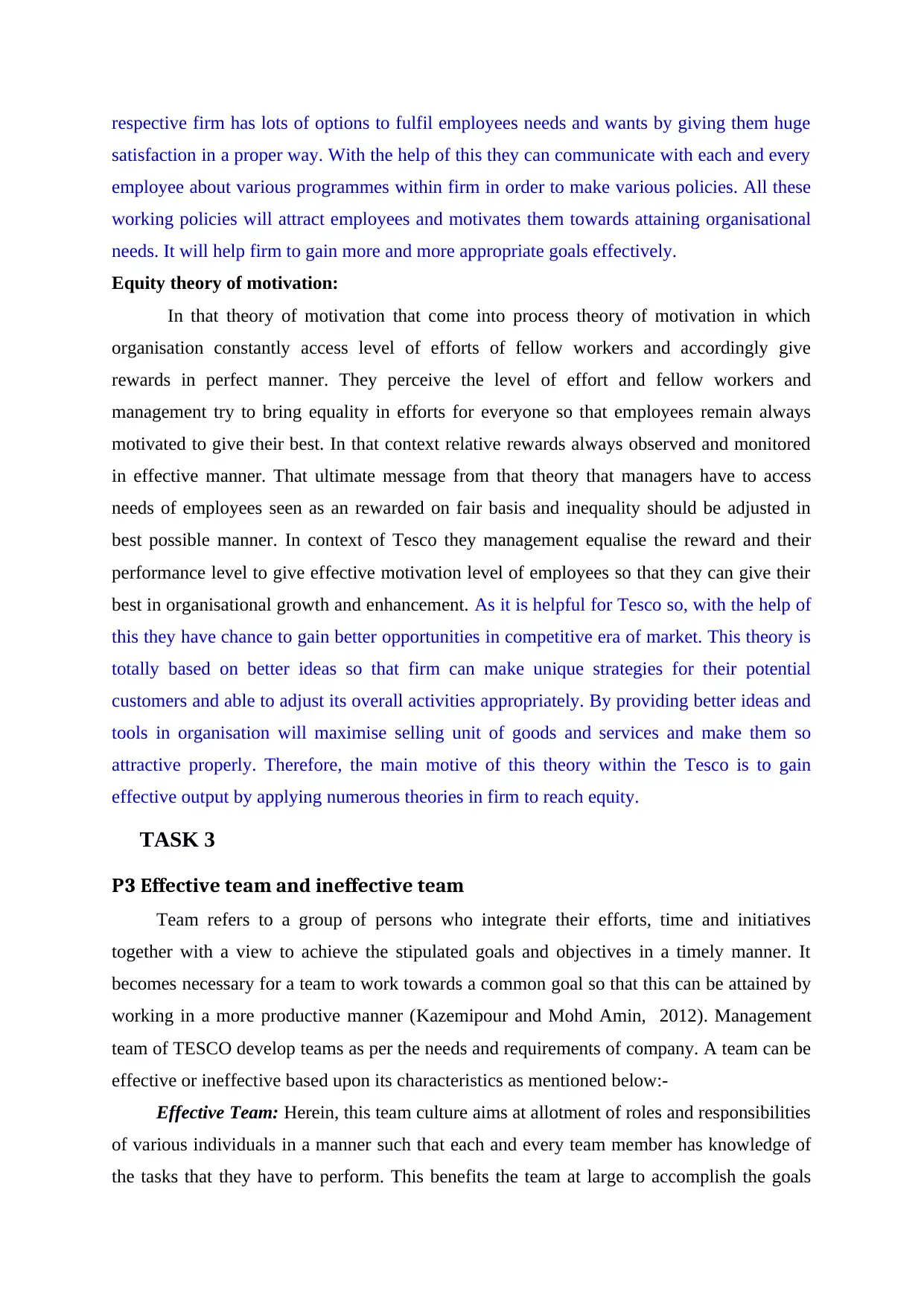
respective firm has lots of options to fulfil employees needs and wants by giving them huge
satisfaction in a proper way. With the help of this they can communicate with each and every
employee about various programmes within firm in order to make various policies. All these
working policies will attract employees and motivates them towards attaining organisational
needs. It will help firm to gain more and more appropriate goals effectively.
Equity theory of motivation:
In that theory of motivation that come into process theory of motivation in which
organisation constantly access level of efforts of fellow workers and accordingly give
rewards in perfect manner. They perceive the level of effort and fellow workers and
management try to bring equality in efforts for everyone so that employees remain always
motivated to give their best. In that context relative rewards always observed and monitored
in effective manner. That ultimate message from that theory that managers have to access
needs of employees seen as an rewarded on fair basis and inequality should be adjusted in
best possible manner. In context of Tesco they management equalise the reward and their
performance level to give effective motivation level of employees so that they can give their
best in organisational growth and enhancement. As it is helpful for Tesco so, with the help of
this they have chance to gain better opportunities in competitive era of market. This theory is
totally based on better ideas so that firm can make unique strategies for their potential
customers and able to adjust its overall activities appropriately. By providing better ideas and
tools in organisation will maximise selling unit of goods and services and make them so
attractive properly. Therefore, the main motive of this theory within the Tesco is to gain
effective output by applying numerous theories in firm to reach equity.
TASK 3
P3 Effective team and ineffective team
Team refers to a group of persons who integrate their efforts, time and initiatives
together with a view to achieve the stipulated goals and objectives in a timely manner. It
becomes necessary for a team to work towards a common goal so that this can be attained by
working in a more productive manner (Kazemipour and Mohd Amin, 2012). Management
team of TESCO develop teams as per the needs and requirements of company. A team can be
effective or ineffective based upon its characteristics as mentioned below:-
Effective Team: Herein, this team culture aims at allotment of roles and responsibilities
of various individuals in a manner such that each and every team member has knowledge of
the tasks that they have to perform. This benefits the team at large to accomplish the goals
satisfaction in a proper way. With the help of this they can communicate with each and every
employee about various programmes within firm in order to make various policies. All these
working policies will attract employees and motivates them towards attaining organisational
needs. It will help firm to gain more and more appropriate goals effectively.
Equity theory of motivation:
In that theory of motivation that come into process theory of motivation in which
organisation constantly access level of efforts of fellow workers and accordingly give
rewards in perfect manner. They perceive the level of effort and fellow workers and
management try to bring equality in efforts for everyone so that employees remain always
motivated to give their best. In that context relative rewards always observed and monitored
in effective manner. That ultimate message from that theory that managers have to access
needs of employees seen as an rewarded on fair basis and inequality should be adjusted in
best possible manner. In context of Tesco they management equalise the reward and their
performance level to give effective motivation level of employees so that they can give their
best in organisational growth and enhancement. As it is helpful for Tesco so, with the help of
this they have chance to gain better opportunities in competitive era of market. This theory is
totally based on better ideas so that firm can make unique strategies for their potential
customers and able to adjust its overall activities appropriately. By providing better ideas and
tools in organisation will maximise selling unit of goods and services and make them so
attractive properly. Therefore, the main motive of this theory within the Tesco is to gain
effective output by applying numerous theories in firm to reach equity.
TASK 3
P3 Effective team and ineffective team
Team refers to a group of persons who integrate their efforts, time and initiatives
together with a view to achieve the stipulated goals and objectives in a timely manner. It
becomes necessary for a team to work towards a common goal so that this can be attained by
working in a more productive manner (Kazemipour and Mohd Amin, 2012). Management
team of TESCO develop teams as per the needs and requirements of company. A team can be
effective or ineffective based upon its characteristics as mentioned below:-
Effective Team: Herein, this team culture aims at allotment of roles and responsibilities
of various individuals in a manner such that each and every team member has knowledge of
the tasks that they have to perform. This benefits the team at large to accomplish the goals
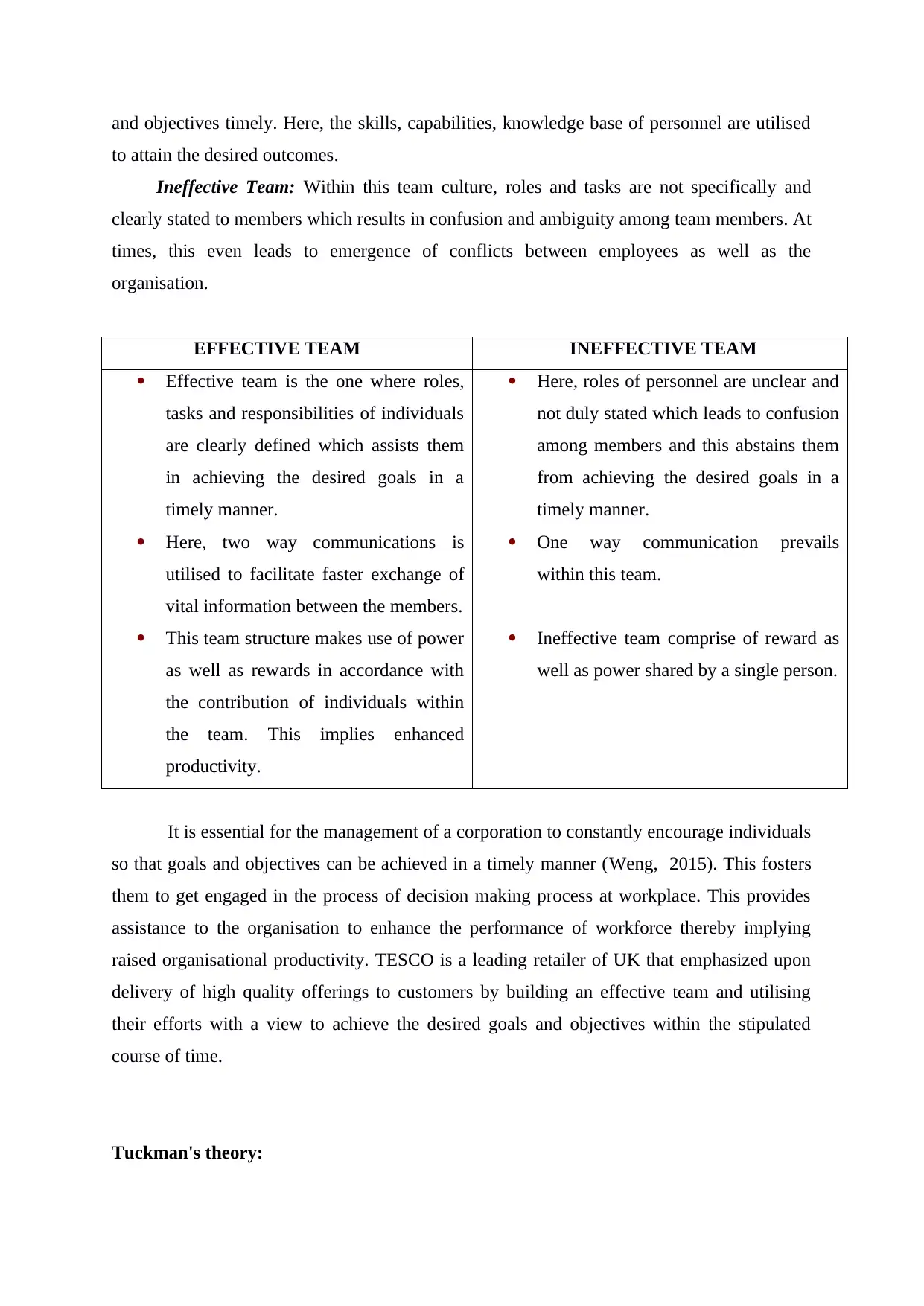
and objectives timely. Here, the skills, capabilities, knowledge base of personnel are utilised
to attain the desired outcomes.
Ineffective Team: Within this team culture, roles and tasks are not specifically and
clearly stated to members which results in confusion and ambiguity among team members. At
times, this even leads to emergence of conflicts between employees as well as the
organisation.
EFFECTIVE TEAM INEFFECTIVE TEAM
Effective team is the one where roles,
tasks and responsibilities of individuals
are clearly defined which assists them
in achieving the desired goals in a
timely manner.
Here, two way communications is
utilised to facilitate faster exchange of
vital information between the members.
This team structure makes use of power
as well as rewards in accordance with
the contribution of individuals within
the team. This implies enhanced
productivity.
Here, roles of personnel are unclear and
not duly stated which leads to confusion
among members and this abstains them
from achieving the desired goals in a
timely manner.
One way communication prevails
within this team.
Ineffective team comprise of reward as
well as power shared by a single person.
It is essential for the management of a corporation to constantly encourage individuals
so that goals and objectives can be achieved in a timely manner (Weng, 2015). This fosters
them to get engaged in the process of decision making process at workplace. This provides
assistance to the organisation to enhance the performance of workforce thereby implying
raised organisational productivity. TESCO is a leading retailer of UK that emphasized upon
delivery of high quality offerings to customers by building an effective team and utilising
their efforts with a view to achieve the desired goals and objectives within the stipulated
course of time.
Tuckman's theory:
to attain the desired outcomes.
Ineffective Team: Within this team culture, roles and tasks are not specifically and
clearly stated to members which results in confusion and ambiguity among team members. At
times, this even leads to emergence of conflicts between employees as well as the
organisation.
EFFECTIVE TEAM INEFFECTIVE TEAM
Effective team is the one where roles,
tasks and responsibilities of individuals
are clearly defined which assists them
in achieving the desired goals in a
timely manner.
Here, two way communications is
utilised to facilitate faster exchange of
vital information between the members.
This team structure makes use of power
as well as rewards in accordance with
the contribution of individuals within
the team. This implies enhanced
productivity.
Here, roles of personnel are unclear and
not duly stated which leads to confusion
among members and this abstains them
from achieving the desired goals in a
timely manner.
One way communication prevails
within this team.
Ineffective team comprise of reward as
well as power shared by a single person.
It is essential for the management of a corporation to constantly encourage individuals
so that goals and objectives can be achieved in a timely manner (Weng, 2015). This fosters
them to get engaged in the process of decision making process at workplace. This provides
assistance to the organisation to enhance the performance of workforce thereby implying
raised organisational productivity. TESCO is a leading retailer of UK that emphasized upon
delivery of high quality offerings to customers by building an effective team and utilising
their efforts with a view to achieve the desired goals and objectives within the stipulated
course of time.
Tuckman's theory:
⊘ This is a preview!⊘
Do you want full access?
Subscribe today to unlock all pages.

Trusted by 1+ million students worldwide
1 out of 20
Related Documents
Your All-in-One AI-Powered Toolkit for Academic Success.
+13062052269
info@desklib.com
Available 24*7 on WhatsApp / Email
![[object Object]](/_next/static/media/star-bottom.7253800d.svg)
Unlock your academic potential
Copyright © 2020–2026 A2Z Services. All Rights Reserved. Developed and managed by ZUCOL.





